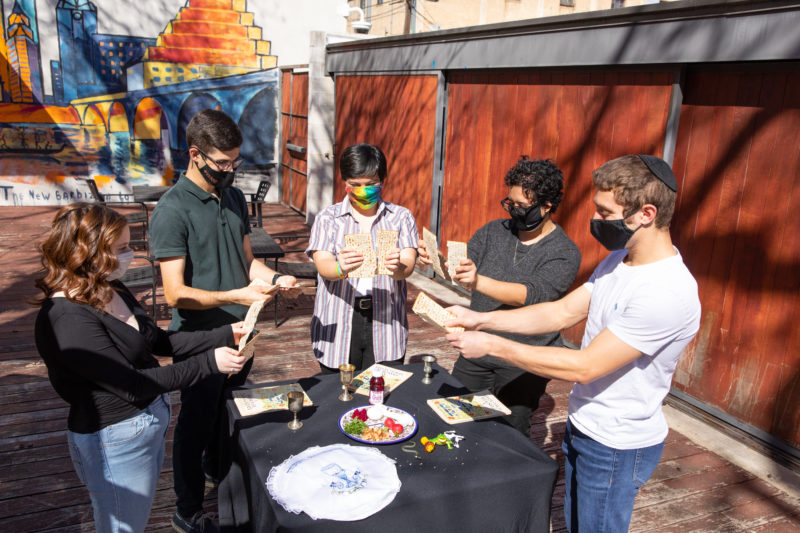Opinion
covid reflections
We’re never going back
In Short
At HiIlel, a year without a traditional game plan for student engagement led to experimentation
It has been a year since my office was relocated to my home, my children’s education became an online experience, and Zoom became my son’s bar mitzvah venue.
While I miss my colleagues and the company of friends, these shifts in our lives – both big and small – have also brought new opportunities and traditions, including regular hikes and nightly dinners together, that my family will likely not leave behind once we emerge from our homes.


Elizabeth McGuire Photography
Similarly, when college campuses emptied last spring, every Hillel altered its approach to meeting the organization’s mission of enriching the lives of Jewish students. Gone were chance meetings on the quad, welcome weeks, festive Shabbat meals and trips to Israel. These rituals were replaced by one-on-one outreach, wellness check-ins, meal distribution for Shabbat cZelebrations, Jewish learning over Zoom, TikTok contests, online cooking classes, book clubs and social media campaigns.
The transition was arduous and disrupted how Hillels have operated for most of the last century. But at the same time, a year without a traditional game plan for student engagement led for some great creativity and experimentation.
Over the past several months, colleagues have shared some provocative statements with me, such as “I’ll never do high holidays the same again” or that “programming as we know it is over.” While we eagerly anticipate the bustle of students returning to campus and in-person experiences once again, the insights of COVID-times also invite reflection on the ways in which we will not and should not go back.
We are sharing a series of reflections from across the Hillel movement about ways in which COVID will influence our work in the time ahead. In my virtual excursions across the Hillel movement this year, and through a qualitative study of best practices in engagement during COVID, a few cogent themes stick out as key insights and practices that I hope endure in the years ahead:
Taking Time for Deep Listening: When the pandemic began, local Hillel staff reached out to students to listen deeply, seeking to understand where they were – not only physically but also emotionally and spiritually. What did they most need right now? Use of surveys, interviews and focus groups increased. And, along with them, valuable insights that helped Hillels better design their activities. The invitation to share also facilitated relationship building. We should continue to not assume we know what students need and instead invest in listening deeply and regularly.
Asynchronous Engagement: With so much of life lived online these days, students are engaging with Hillel in virtual spaces. But not all engagement is live. Earlier this fall, 60 students attended a Hillel@Home session to speak with Natan Shransky and Gil Troy. It was a lively session and students engaged in a give-and-take with the speakers. Following the event, the recording was posted on the Hillel@Home website and 3,500 more people watched in the following days. While we still believe live engagement in optimal, we should begin to account for asynchronous engagement with Jewish content and determine what impact it has on the consumer.
A Focus on Depth: While fewer students are attending Hillel programs in COVID times, those who do are engaging more deeply. Hillel’s Jewish Learning Fellowships translated particularly well to an online space, convening the same small group of students weekly over several months for Jewish study and conversation about life’s big questions. By year’s end, over 9,000 Jewish students will have participated in deep Jewish learning experiences, more than double the students who engaged pre-pandemic. Our students feel alone and crave community even in “normal times,” which means we should continue to invest in building meaningful communities of Jewish learning and deep connection with peers and mentors.
Boundaryless Community Building: Even from their childhood bedrooms, students are using Hillel’s platform to connect over shared interests and identities. More than 800 students around the world tuned in to a Purim drag show organized by University of Illinois Hillel and Hillel@Home, elevating a standard campus event into a global celebration. There are countless examples of new connections that were born in COVD that will likely continue, from Hillel student presidents across North America meeting regularly on Slack to Jews of color who may feel isolated on their campus but have found community in virtual spaces.
Increased Accessibility: Unable to host large gatherings for Shabbat, many Hillels began providing Shabbat “to-go” kits with ritual items and treats, or even full Shabbat meals. While many missed the bustling, communal Shabbat experience, they also recognized that students who had never before participated in Shabbat experiences were doing so now. These small, intimate podded Shabbats provide a lower barrier for those intimidated to enter a Jewish space or for others who experience the discomfort of sensory overload in large gatherings. Hillels should draw inspiration from these experiences to reimagine Shabbat and holiday experiences in ways that even more students find accessible and meaningful.
We know students, campuses and communities will not turn back on like a light switch in the next year. Hillel’s challenge in the coming months will be to balance these new approaches and their learnings with the desire to return to what was impactful before the pandemic. My hope is that combining the best of in-person and online engagement will allow Hillels to offer even more avenues for Jewish engagement and connect with even more students.
Jennifer Zwilling is the Chief Strategy and Campus Success Officer at Hillel International.












